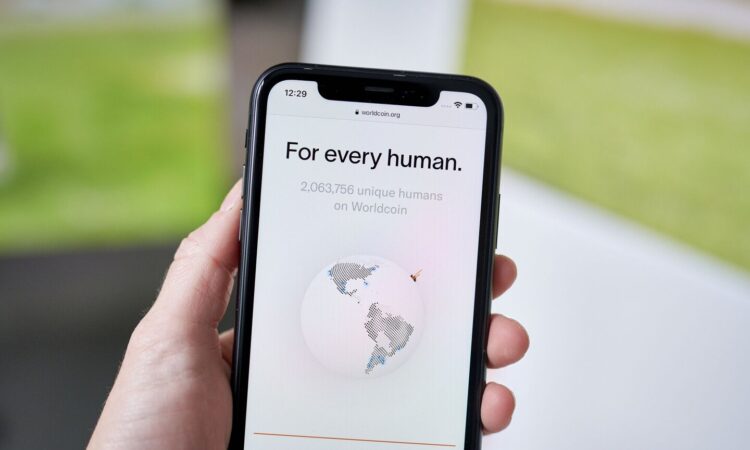
So far, so crypto. Clearly, there’ll always be some kind of market for speculative tokens lacking intrinsic value. But Worldcoin does have something worth taking a closer look at: Those orbs, and the apparent willingness of 2 million people and counting to scan their irises in return for… well, what exactly? In a world where our data is regularly hoovered up by web browsers, social-media networks and smartphone apps, why would people willingly hand sensitive biometrics to Worldcoin and its opaque foundation, based in the regulation-lite Cayman Islands, especially after reports of hacks and fraud?
I decided to take a look for myself and booked an appointment with a newly-arrived Worldcoin orb in Paris’s Latin Quarter, where 1960s students once rebelled against the established order. Today, they’re more likely to relish the chance to work on an AI project like this one. When I step into the hipster-ish cafe where the tell-tale chrome orb is busy scanning one of its first customers on Thursday, I’m greeted by a Worldcoin operator called Paul, a graduate audio engineer, who’s doing this as a summer job after finishing his studies.
As Paul runs through the familiar pitch of Worldcoin’s end goal of proving “personhood” by scanning 8 billion people’s eyes, in turn generating unique identifiers and using that database to verify access to anything from financial services to universal basic income, I note the company logo on his T-shirt — a picture of the world combined with the Greek letter “epsilon” and a circle. It all feels like a bad episode of Star Trek: A utopian vision intended to escape a future of AI machines, but with its own gloomy unintended consequences. Why should we trust this company to manage such a global digital turnstile? How easy will it be for others to “enrich” this ID with more of my personal data? And aren’t Worldcoin’s early backers — including the likes of Sam Bankman-Fried and Three Arrows Capital — best placed to cash out first whatever happens?
Unlike Worldcoin’s first “field tests” in countries such as Indonesia, which prompted accounts of exploitation and invasion of privacy, I have a hard time believing many French people would willingly peer into a chrome-shaped orb for a few tokens, at least not without asking some tough questions about reports of a black market for those ID codes in territories such as China. After all, this is Western Europe, the land of the GDPR, where people take privacy seriously and where tech regulation comes before tech innovation.
I’m wrong, it turns out, as a steady line of willing eyeballs mostly belonging to trendy-looking men forms. There’s little chit-chat — the aim is to claim one’s free Worldcoin, and data privacy seems less urgent. One bewildered-looking middle-aged man who finishes his scan asks: “Do I have to pay?” Seeing his relief at the answer, I point out: “But you already did pay. You gave your iris scan.” I am quickly corrected by Paul, who tells me that the orb deletes the scan — instead, what’s transmitted is a unique ID code that proves its owner is a human, but nothing more.
That may be true, but it shows to what extent consent becomes a fuzzy concept when handing over sensitive data, even if it can’t be traced back to its original owner. Do I really know how my unique ID, based on my biometrics, will be used in the future, or potentially cross-pollinated with other data? Hence why the UK’s data regulator is taking a closer look — it told Bloomberg News that users need to be able to withdraw their consent “without detriment” — and why other European regulators will, too.
It’s finally my turn to volunteer my eyeball to Worldcoin — something I probably wouldn’t do without writing this column in mind. The process takes seconds rather than minutes: The app generates a QR code, the orb scans it, and then I look into its eye for a few seconds. I can’t hear it speak above the hubbub of the cafe, but I’m assured that a soothing female voice is guiding me through the whole thing. The Worldcoin vision for the future is of orbs manufactured everywhere, bringing in ID revenue — again, the kind of dystopian sci-fi concept that Parisian students might once have equated with social order and discipline. Today, tech’s panopticon is greeted as data-driven, utilitarian — and of course potentially profitable. One can imagine what the reaction would be if the government tried to roll out its own all-seeing orbs, though.
As I leave, I ask another happy customer, a 37-year-old developer called Jonathan, holding a futuristic-looking monocycle, why he got his iris scanned. He tells me he’s interested in the project, the aim of verifying human-ness, and in Altman’s vision. But when I ask him whether he would have done this without free crypto(1), he admits he’s been looking at the price since launch. “It’s starting to look expensive,” he says, “and usually it’s not a good idea to buy when there’s buzz.” Getting something for nothing, though, was evidently worth a closer look — as long as you turn a blind eye to the cost of giving up more of your personal data.
More From Bloomberg Opinion:
• Secretive Chatbot Developers Are Making a Big Mistake: Dave Lee
• AI Shines a Spotlight on Hollywood Hypocrisy: Parmy Olson
• Sam Altman Asked For AI Rules. The EU Answered: Lionel Laurent
(1) I won’t be applying for my free token.
This column does not necessarily reflect the opinion of the editorial board or Bloomberg LP and its owners.
Lionel Laurent is a Bloomberg Opinion columnist covering digital currencies, the European Union and France. Previously, he was a reporter for Reuters and Forbes.
More stories like this are available on bloomberg.com/opinion






